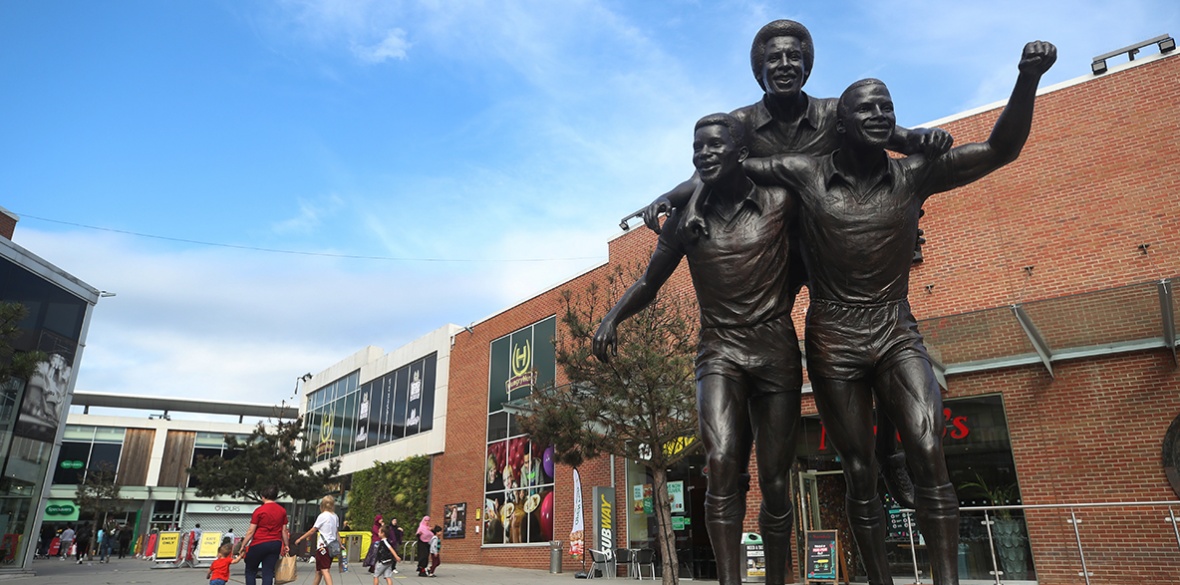This is the last article you can read this month
You can read more article this month
You can read more articles this month
Sorry your limit is up for this month
Reset on:
Please help support the Morning Star by subscribing here
PLYMOUTH Argyle’s Jack Leslie was selected to play for the England football team against Northern Ireland on October 25 1925, then inexplicably dropped — the reason being, he was black.
In the event, Leslie ended up scoring twice for Argyle, who cruised to a 7-2 victory over Bournemouth on the day of the England game. England drew 0-0.
The story of Leslie is one of the many fascinating accounts contained in Football’s Black Pioneers by Bill Hern and David Gleave.
There has certainly been some painstaking research into this book, that tracks down the first black player to turn out for all of the 92 league clubs.
There are accounts of players like Laurie Cunningham (first black player for West Brom and England Under 21), Viv Anderson (first black player for Nottingham Forest and England) and Brendon Batson (first black player at Arsenal, though later as part of the famous West Brom trio together with Cunningham and Cyrille Regis).
A particularly interesting chapter for West Ham supporters is the one featuring Clyde Best, who was not the first black player to play for the club but a real pioneer.
The year was 1968, when Clyde came over at the age of 17 from Bermuda to play for West Ham. Clyde was playing for the first team a year later. I remember seeing Clyde, who played for the club until the mid-1970s, scoring lots of goals and becoming a firm fans’ favourite.
However, he did have to endure some horrendous racism.
The authors recall one occasion, when Clyde received a letter with the threat that acid would be thrown at him, as he came out of the tunnel onto the pitch. The police took the threat seriously, creating a cordon between players and fans as they emerged.
West Ham were the first club to field three black players when Best, Ade Coker and Clive Charles took the field against Tottenham in 1972.
The litany of racist abuse chronicled in the book is sickening, from Chelsea’s Paul Canoville receiving racist abuse from his own fans to the experiences of Chris Kamara, now a football pundit, who was abused as both a player and manager.
The black players have been defiant in the face of adversity. There was Leyton Orient’s Bobby Fisher and Laurie Cunningham, giving the black power salute to baying Millwall fans, and Howard Gayle (Liverpool, Newcastle and Blackburn) turning down the MBE in 2016. Gayle did not feel he could accept the honour after what the British empire did to his family and ancestors.
Some managers seemed to recognise the horrendous experience that black players went through, especially when they were alone at a club.
In 1984, Sunderland manager Len Ashurst brought Gayle to the club to join Gary Bennett. In his book, Ashurst referred to the signings as a “seminal moment.” He recalled racism and bigotry being rife in the game and how he was determined it would not raise its ugly head during his time on Wearside.
While famous players feature, many chronicled by Hern and Gleave will be little known outside of their clubs — the period stretches back right into the 19th century for some clubs.
There are stories like that of Lindy Delaphena, who was the first black player at four clubs, making his debut for Portsmouth in 1948 before going on to Middlesbrough, Mansfield Town and Burton Albion.
Among other highlights are Roland Butcher who played for Stevenage, before making his name as the first black cricketer to represent England in a Test match in 1981.
Also, Charlie Williams MBE, who played for Doncaster Rovers, though possibly made a bigger name for himself later as a comedian.
Hern and Gleave provide a real insight into the struggle of so many black players over the years to make their way in the game. An excellent read.
Racism is still of course rife, though not as bad, as in the days of the likes of Best, Cunningham and Canoville. This is testimony to the bravery and resilience of so many players down the years.
The change of attitude, though, is nicely noted by the authors, in the example of the tributes paid by clubs across the country at the time of Cyrille Regis’s death in 2018 — a far cry from the days when as a player Cyrille was greeted with banana skins and worse.










